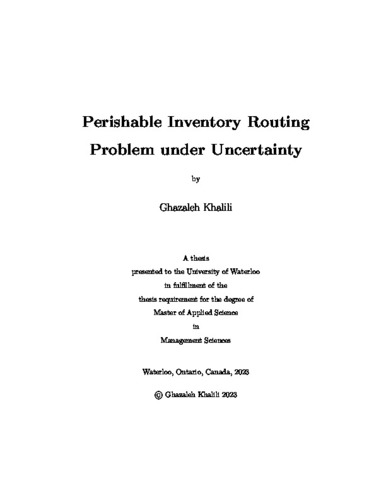| dc.contributor.author | Khalili, Ghazaleh | |
| dc.date.accessioned | 2023-08-24 13:41:04 (GMT) | |
| dc.date.available | 2023-12-23 05:50:04 (GMT) | |
| dc.date.issued | 2023-08-24 | |
| dc.date.submitted | 2023-08-15 | |
| dc.identifier.uri | http://hdl.handle.net/10012/19755 | |
| dc.description.abstract | In an Inventory Routing Problem (IRP), a decision-maker decides the number of units delivered to each retailer and determines delivery routes, which becomes increasingly challenging as the network expands.
Incorporating uncertainty and perishability into the IRP gives rise to a more complex problem known as the stochastic Perishable Inventory Routing Problem (PIRP). Traditional approaches, such as dynamic programming, often struggle to efficiently solve this problem. This is due to the curse of dimensionality, which grows exponentially with the number of retailers and the product's shelf life.
In this work, we decompose the PIRP into a Perishable Inventory Problem (PIP) and a Vehicle Routing Problem (VRP) and address them sequentially in two distinct phases. By successfully determining the replenishment quantities first, we then solve the VRP using state-of-the-art algorithms. Consequently, our primary focus lies in identifying the optimal replenishment quantities for perishable products.
To address the complexities of this problem, we propose a Direct Lookahead Approximation (DLA) policy designed for sequential decision-making problems under uncertainty. Specifically, we employ a two-stage approximation method that considers a limited number of sample paths while still achieving promising results.
The problem is formulated as a mixed-integer programming (MIP) model with the objective of minimizing holding, shortage, wastage, and replenishment costs. In this context, a fixed cost is employed as an approximation for the routing costs of the second phase.
To enhance the implementation of the DLA policy, we conduct a comprehensive analysis and recommend techniques such as incorporating linear cuts into the MIP model.
To evaluate the effectiveness of the policy, we examine a blood supply chain focusing on perishable platelet units. Through extensive experiments, we demonstrate that the proposed policy can significantly outperform several known algorithms in the literature. | en |
| dc.language.iso | en | en |
| dc.publisher | University of Waterloo | en |
| dc.subject | Perishable Inventory Routing Problem | en |
| dc.subject | Uncertain Demand | en |
| dc.subject | Direct Lookahead Policy | en |
| dc.subject | Mixed-Integer Programming | en |
| dc.subject | Blood Supply Chain | en |
| dc.title | Perishable Inventory Routing Problem under Uncertainty | en |
| dc.type | Master Thesis | en |
| dc.pending | false | |
| uws-etd.degree.department | Management Sciences | en |
| uws-etd.degree.discipline | Management Sciences | en |
| uws-etd.degree.grantor | University of Waterloo | en |
| uws-etd.degree | Master of Applied Science | en |
| uws-etd.embargo.terms | 4 months | en |
| uws.contributor.advisor | Abouee-Mehrizi, Hossein | |
| uws.contributor.advisor | Ghadimi, Saeed | |
| uws.contributor.affiliation1 | Faculty of Engineering | en |
| uws.published.city | Waterloo | en |
| uws.published.country | Canada | en |
| uws.published.province | Ontario | en |
| uws.typeOfResource | Text | en |
| uws.peerReviewStatus | Unreviewed | en |
| uws.scholarLevel | Graduate | en |

